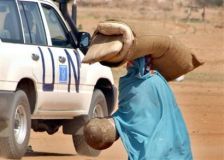Insecurity bars effective protection of Darfur victims
Dec 13, 2005 (UNITED NATIONS) — Insecurity prevents effective protection of victims and witnesses of ongoing violence in Sudan’s Darfur region, hampering investigations, according to a report by the prosecutor of the International Criminal Court released Tuesday.
 The report by ICC prosecutor Luis Moreno-Ocampo of Argentina said the continuing insecurity did not “allow for an effective system of victim and witness protection.”
The report by ICC prosecutor Luis Moreno-Ocampo of Argentina said the continuing insecurity did not “allow for an effective system of victim and witness protection.”
“This has forced my office to investigate outside Sudan and represents a serious impediment to the conduct of effective investigations in Darfur by national judicial bodies as well,” he added.
Ocampo, who briefed the UN Security Council Tuesday, said his office had in the first phase of its probe drawn “a comprehensive picture of the crimes allegedly committed in Darfur since July 1, 2002.
“From this overall picture we have identified particularly grave events, involving high numbers of killings, mass rapes and other forms of extremely serious gender violence for full investigation,” he noted.
Ocampo said that in the coming next phase, his office would focus on “a selected number of criminal incidents and those persons bearing greatest responsibility for those incidents.”
He said that the ICC would identify persons to be prosecuted for those crimes but noted that a list of 51 names prepared by an international commission of enquiry remained sealed and was in no way binding on him.
“We will conduct our own independent investigations, in accordance with our statute and policies,” he noted. “I would like to emphasize that no decisions have yet been taken at this stage as to whom to prosecute.”
Monday, Human Rights Watch (HRW) charged that Sudan’s top leadership, including President Omar el-Beshir, bears responsibility for widespread atrocities committed in Darfur.
The New York-based group called for the UN Security Council and individual nations to take stronger measures to end atrocities there and boost the African Union (AU) military mission in the region.
And it called on the ICC to investigate Sudan’s entire leadership for possible prosecution for the abuses.
The (ICC), which is linked to the United Nations, is the first permanent, independent court to try those accused of war crimes, crimes against humanity and genocide.
Speaking as president of the Security Council for December, Britain’s UN envoy Emyr Jones Parry told reporters Tuesday: “the council repeats again the need to end impunity in Darfur to prevent the atrocities occurring, to prevent their recurrence and to then ensure that those involved are brought to justice.”
He said talks with Ocampo had confirmed that the ICC prosecutor was working in close cooperation with the Khartoum government and “that those discussions are proceeding so far well.”
“The council expect them to be maintained so that any cooperation the prosecutor expects from that government should be forthcoming, especially on the question of access to witnesses,” Jones Parry added.
War broke out in Darfur in 2003 when rebel groups began fighting what they say is the political and economic marginalisation of the region’s black African tribes by the Arab-led regime in Khartoum.
As many as 300,000 people have died and more than two million fled their homes in what UN aid agencies have dubbed the world’s worst humanitarian crisis with reports of rapes, extrajudicial killings and other atrocities rampant.
Much of the abuse is blamed on Khartoum’s proxy militias — the so-called “Janjaweed” — but in its report, HRW placed responsibility higher, citing witness accounts from refugees and interviews with Sudanese soldiers and officials.
(AFP/ST)
